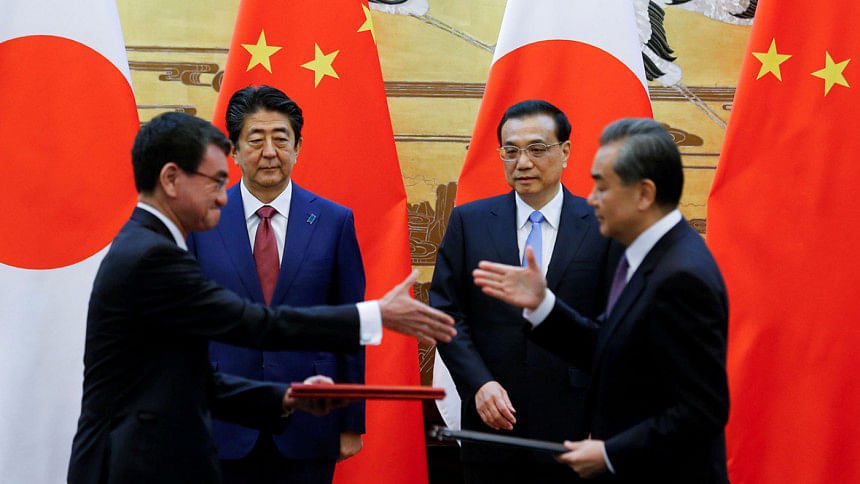China, Japan to forge closer ties at 'historic turning point'

China and Japan today pledged to forge closer ties as both countries stood together at an "historic turning point", signing a broad range of agreements including a $30 billion currency swap pact, amid rising trade tensions with Washington.
Japan-China ties at 'historic point'
Japan-China to seek peace on Korean peninsula
China says long-term stable ties good for world
First Sino-Japanese summit since 2011
Japan, China ink currency swap deal of up to 3.4 trln yen
Japanese Prime Minister Shinzo Abe and Chinese Premier Li Keqiang also agreed the two countries would work together to achieve denuclearisation on the Korean Peninsula.
The pacts were reached on Abe's three-day visit to Beijing as the two neighbours looked to carve out new areas of cooperation and seek new ways to promote trust, which has been fragile at times since diplomatic relations resumed in 1972.
"From competition to co-existence, Japan and China bilateral relations have entered a new phase. Hand in hand with Premier Li, I would like to advance our ties forward," Abe said at a briefing.
Abe is expected to meet with President Xi Jinping later today in the first full-scale Sino-Japanese summit since 2011.
Japanese firms including big auto companies like Toyota hope to see normalised ties with China so they can compete with US and European rivals, while Beijing expects Tokyo's endorsement of its ambitious Belt and Road programme, an initiative that Xi hopes will further boost trade and transport links with other countries.
Abe also said Tokyo was "determined" to normalise diplomatic relations with Pyongyang, but only if preconditions were met, including denuclearisation and the release of kidnapped Japanese citizens.
"Our two countries bear large responsibility in achieving peace and stability in this region," Abe said.
Efforts in advancing China-Japan ties should "persevere unremittingly to prevent the appearance of new twists and turns" so that previous efforts did not go to waste, said Li at a joint briefing with Abe today.
"The Chinese side is willing to work with the Japanese side to return to a normal track, and maintain the stable, sustained and healthy development of bilateral relations," he said, adding that he had held candid discussions with Abe since his arrival on matters of mutual concerns.
They reached consensus, Li said, that safeguarding long-term healthy and stable China-Japan ties was in accordance with the interests of both countries and the region and the world.
The move to boost economic ties came as China and the United States slap tit-for-tat tariffs on each other in recent months. Japan is at risk as it exports to China manufacturing equipment and electronic parts, which are used to make finished goods for the United States and other markets.
Ahead of the briefing, China and Japan signed an agreement to prepare yearly plans for talks, dialogues and exchanges, as well as a pact to step up cooperation in innovation.
They also agreed to boost cooperation in the securities markets including the listing of exchange-trade funds (ETFs), and facilitate smoother customs clearance.
Both sides signed a currency swap agreement of up to 3.4 trillion yen ($30.29 billion), effective until 2021. They also inked a deal towards establishing a yuan clearing bank.
Li said both sides had agreed that as major countries, China and Japan should uphold free trade and accelerate talks on the Regional Comprehensive Economic Partnership (RCEP) and on a China-Japan-Korea trade zone.
RCEP is a free trade agreement proposed by China with Southeast Asia and various countries on the Pacific Rim including Japan.

 For all latest news, follow The Daily Star's Google News channel.
For all latest news, follow The Daily Star's Google News channel. 





Comments